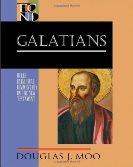The name Douglas Moo is a familiar one to student of the New Testament everywhere, and just as the arrival of his famous NIC commentary on Romans was a landmark event, so now we expect the same with the arrival of his BEC commentary on Galatians. He has a proven track-record of careful, reliable exegesis, and this latest contribution we expect will set the new standard.
Dr. Moo is with us today to talk about his new Galatians commentary, and thanks to Dr. Jarvis Williams, our review editor for New Testament, for submitting these helpful interview questions.
Books At a Glance:
Why write yet another commentary on Galatians (I’m writing one too!!)?
Moo:
Selfishly, I like writing commentaries! – so I leaped at the opportunity to write another one. But, taking a broader perspective, I thought that it might be useful to contribute something to the continuing debate about the argument of Galatians with respect to the so-called “old” and “new” perspectives. I tried to work out some answers to this issue in my work on Romans, but Galatians presents its own set of challenges, with an argument more focused on Jewish legal issues and therefore more apparently open to a new perspective approach than Romans.
 Books At a Glance:
Books At a Glance:
You’ve become quite famous for your Romans commentary. Is there anything about Paul’s soteriology that you’ve modified in your Galatians commentary in comparison to something you may have written in your Romans commentary (e.g. Justification, law)?
Moo:
I am either unimaginative or stubborn (or both!), but I have not changed much in my “take” on Paul’s soteriology – except at one point. When I wrote my Romans commentary, I took what might be called a “standard” Reformation approach, arguing that Paul sees justification as a definitive, once-for-all verdict pronounced at the time of conversion. And texts such as Rom. 5:1 and 5:9 can certainly support such a view. But as I entered deeply into the argument of Galatians, and especially the exegesis of 5:2-6, I began to see a different perspective. Here, I concluded, Paul suggests that “righteousness” (the verdict of “being justified”) is pronounced in the future for the believer. This future element of justification also seemed to me to make sense in the context of the argument of Galatians generally. So I am working to integrate this future aspect of justification (a perspective we find also, I think, in James 2) into my overall understanding of justification in Paul. Of course, it should be said that, as R. Gaffin has pointed out, a future element of justification has had a solid place in certain strands of Reformation theology – so I don’t think I am departing from the tradition. But the integration of this future aspect with the pretty clear suggestion of a definitive verdict at conversion is a challenge.
Books At a Glance:
Now that your commentary on Galatians is finished, what passage or issue do you wish you could have given more attention to in the commentary?
Moo:
I discover my failures adequately to understand texts when I have to teach them and I find myself incoherently wandering around without a clear and convincing conclusion. In teaching Galatians since I wrote the commentary, I have felt this lack of clarity especially in explanations of Gal. 5:17. This is a notoriously tough text, and I am not sure that I have been able to explain it very well.
Books At a Glance:
Are you more or less sympathetic to new and newer perspective readings of Galatians now than when you wrote your Romans commentary? Please explain your answer.
Moo:
I don’t think my overall “perspective” on the “new perspective” has changed much. But one important aspect of my Galatians is the attempt to wrestle with newer and far more radical readings of Galatians and of Paul’s theology in general than we find in, e.g., Dunn and Wright. I remain convinced that Dunn and Wright put too little stress on what we might call fundamental “human” issues in their focus on Jewish/Gentile relationships. But I remain unconvinced that their views are ultimately all that damaging to traditional Reformation theology. But the views of some other scholars and movements that have taken the “new” perspective in more radical directions are seriously problematic.
 Books At a Glance:
Books At a Glance:
What’s one piece of advice that you would give to young scholars writing commentaries on Galatians?
Moo:
Avoid defensiveness. The heated polemical context in which we write about Scripture today, with all the academic options out there, can loom so large that we spend far too much time arguing with others and too little patiently and clearly explaining what the text is saying. This principle applies to commentaries in general, by the way, and not just to those on Galatians.
Books At a Glance:
What’s one piece of advice that you would give to pastors who plan to preach through Galatians?
Moo:
Integrate with historical and systematic theology. It goes without saying that Galatians, like any other book of Scripture, must be set in its first-century context, with due regard for the issues Paul and the “agitators” were fighting about. And the relevance of these issues and the answers Paul gives for the contemporary church will very much depend on our understanding of those contextual matters. But the ultimate “point” of Galatians is to form our views of central elements in Christian theology: the place of the law, justification, the work of the Spirit, etc. Understanding and effectively proclaiming these theological issues cannot be effectively done without a sense of how Galatians “plugs into” larger historical and theological frameworks.

